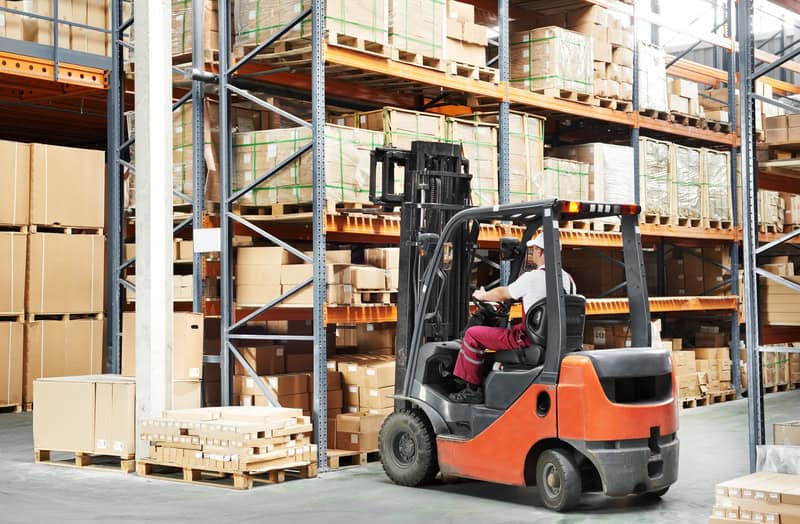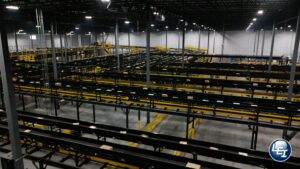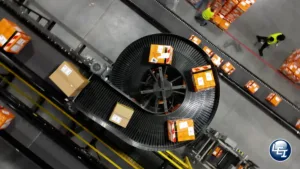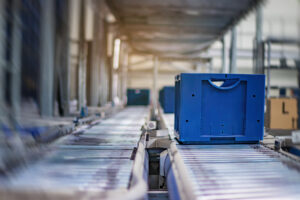Table of Contents
Cross docking has become a vital strategy in logistics and warehouse management, helping businesses streamline operations and reduce costs. For companies looking to minimize storage time, improve efficiency, and meet growing consumer demands, this can be a game changer. At Lafayette Engineering, we specialize in providing tailored material handling solutions, including optimizing systems for businesses of all sizes.

What is Cross Docking?
Cross docking is a warehousing strategy where products are received at an inbound dock and immediately transferred to an outbound dock for distribution, bypassing long-term storage. This approach is particularly effective for businesses that need to move goods quickly, such as perishable products or high-demand retail items. Instead of storing items in a warehouse for an extended period, goods are moved directly from the receiving dock to shipping, often within hours.
By eliminating the need for storage, cross docking reduces handling time, lowers warehousing costs, and accelerates delivery timelines. While the concept seems straightforward, implementing an effective system requires a high level of coordination, technology integration, and optimized facility layouts.
Types of Cross Docking
Its not a one-size-fits-all approach. It can be customized based on a business’s unique needs. Here are a few common types:
- Retail: Products are delivered to a retailer’s warehouse, where they are sorted and repacked before being sent directly to the store or consumer.
- Manufacturing: Components needed for production are received and sent directly to the production line without intermediate storage.
- Distributor: Products from various suppliers are consolidated at a single facility and shipped out together, reducing the number of shipments and costs.
- Transport: This process involves consolidating shipments from multiple vendors into fewer outbound deliveries, improving efficiency and lowering transport costs.
The Benefits
1. Reduced Warehousing Costs
One of the most immediate benefits is cost reduction. Since products spend little to no time in storage, businesses can minimize the need for large warehouse facilities. This also reduces the costs associated with inventory management, such as handling, labor, and rent for storage space.
2. Faster Delivery Times
It enables businesses to significantly speed up the delivery process. Goods are transferred quickly from inbound to outbound docks, eliminating the delays associated with traditional warehousing. This is especially beneficial for industries with high turnover products or those that rely on just-in-time (JIT) delivery models.
3. Improved Product Quality
For products sensitive to storage conditions, such as perishables, cross docking can help maintain higher quality by reducing the time spent in storage. By moving these goods quickly through the supply chain, businesses can ensure they reach customers in optimal condition, reducing spoilage or damage risks.
4. Increased Supply Chain Efficiency
This service streamlines the entire supply chain by reducing the steps involved in handling goods. With fewer touchpoints, there’s less chance for errors, damages, or delays, allowing businesses to operate more efficiently. Additionally, cross docking helps consolidate shipments, meaning fewer trucks are required for transport, leading to better fuel efficiency and lower transportation costs.
5. Enhanced Inventory Management
Traditional warehousing often involves managing large quantities of stored goods, increasing the risk of excess inventory or stock shortages. It enables businesses to operate with a more agile inventory management system, moving products as needed and reducing the need for excessive stockpiling. This leads to fewer markdowns and a reduced risk of obsolescence.
How Lafayette Engineering Supports Cross Docking Solutions
At Lafayette Engineering, we understand that each business has unique requirements when it comes to logistics and material handling. Our expert team designs and implements custom systems tailored to your specific needs. Whether you’re looking to optimize your warehouse layout, upgrade your conveyor systems, or integrate new technologies, we are here to help you enhance your cross docking operations.
Our services include:
- Conveyor System Design: We specialize in designing conveyor systems that efficiently move products from receiving to shipping with minimal handling, ensuring a smooth cross docking process.
- Automated Sorting Solutions: Lafayette Engineering can integrate automated sorting systems that streamline product sorting and distribution, increasing speed and reducing labor costs.
- Material Handling Equipment: From pallet jacks to forklifts, we provide a wide range of material handling solutions to complement your cross docking operations, improving productivity and safety.
- Technology Integration: Leveraging advanced software and hardware solutions, Lafayette Engineering helps businesses implement real-time tracking and inventory management systems that enhance the efficiency and accuracy of cross docking.
Frequently Asked Questions (FAQs)
What industries benefit most?
Industries such as retail, e-commerce, manufacturing, and food and beverage often benefit the most from cross docking due to the fast-paced nature of their supply chains and the need for rapid product turnover.
Can cross docking be implemented in small businesses?
Yes, cross docking can be scaled to fit the needs of both large and small businesses. The key is designing a system that fits your specific operational needs, which Lafayette Engineering can help with.
How does cross docking improve customer satisfaction?
By reducing delivery times and ensuring products arrive in optimal condition, cross docking allows businesses to meet customer demands more effectively, leading to higher satisfaction levels.
Does cross docking require specialized equipment?
While basic cross docking can be performed with standard warehouse equipment, implementing automated sorting systems, conveyor belts, and real-time tracking technology can significantly improve efficiency.
What is the cost of implementing?
The cost varies based on the size of the facility, the complexity of the system, and the level of automation. Lafayette Engineering can provide a customized quote based on your specific requirements.
Conclusion
Cross docking offers immense benefits for businesses looking to streamline their supply chains and reduce costs. By minimizing the need for storage and enhancing the speed of product movement, helps businesses operate more efficiently and meet customer expectations. At Lafayette Engineering, we are committed to helping businesses optimize their systems with tailored material handling solutions. Contact us today to learn how we can improve your operations.
For more information about how Lafayette Engineering can support your needs, visit our website or connect with us on LinkedIn.



